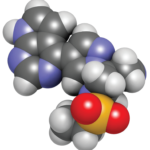At Week 24, researchers found 67% of patients receiving 4 mg baricitinib achieved resolution of SLEDAI-2K arthritis or rash. The safety profile of baricitinib in patients with active SLE receiving standard of care treatment was consistent with previously published findings. The 4 mg treatment group experienced a single episode of deep-vein thrombosis. Baricitinib treatment also resulted in modest dose-associated decreases in hemoglobin neutrophil and triglyceride concentrations, as well as increases in platelet counts, concentrations of creatine phosphokinase, HDL cholesterol and total cholesterol.
Lara C. Pullen, PhD, is a medical writer based in the Chicago area.
ad goes here:advert-1
ADVERTISEMENT
SCROLL TO CONTINUE
Reference
- Wallace DJ, Furie RA, Tanaka Y, et al. Baricitinib for systemic lupus erythematosus: A double-blind, randomised, placebo-controlled, phase 2 trial. Lancet. 2018 Jul 21;392(10143):222–231. doi: 10.1016/S0140-6736(18)31363-1.



